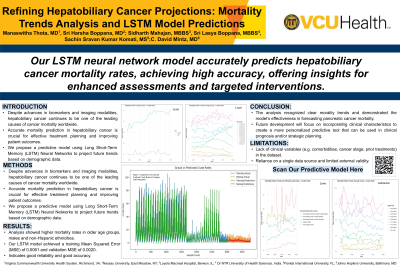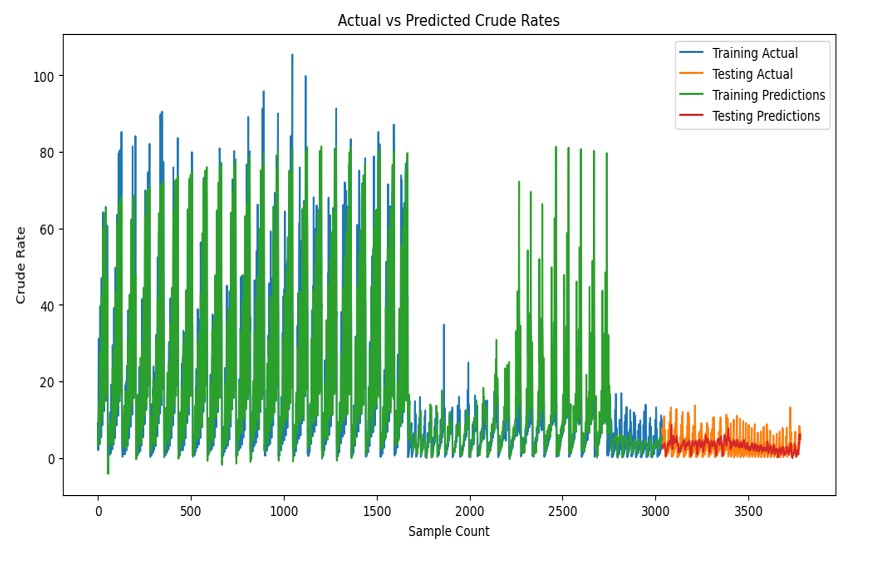Tuesday Poster Session
Category: Liver
P4656 - Hepatobiliary Carcinoma - Analyzing Current Mortality Trends and Developing an Advanced Long Short-Term Memory (LSTM)-Based Predictive Model for Projecting Future Trends
Tuesday, October 29, 2024
10:30 AM - 4:00 PM ET
Location: Exhibit Hall E

- MT
Manaswitha Thota, MD
Virginia Commonwealth University Medical Center
Richmond, VA
Presenting Author(s)
Manaswitha Thota, MD1, Sri Harsha Boppana, MBBS2, Sidharth Mahajan, MBBS3, Sachin Sravan Kumar Komati, MSc4, C. David Mintz, MD, PhD5
1Virginia Commonwealth University Medical Center, Richmond, VA; 2Nassau University Medical Center, East Meadow, NY; 3MacNeal Hospital Loyola Medicine, Berwyn, IL; 4Florida International University, Miami, FL; 5Johns Hopkins University School of Medicine, Baltimore, MD
Introduction: Despite advances in biomarkers and imaging modalities, hepatobiliary cancer continues to be one of the leading causes of cancer mortality worldwide. This study describes current trends in hepatobiliary cancer and tests a Long Short-Term Memory (LSTM) neural network tool to enhance our ability to predict future trends in hepatobiliary cancer using demographic data.
Methods: We extracted mortality data from the Center for Disease Control and Prevention (CDC) Wide-Ranging Online Data for Epidemiologic Research (WONDER) Database spanning 1999-2020, normalized it and encoded categorical variables (age, sex, ethnicity, and race) numerically. Using Studio R, this data was analyzed to help identify and describe trends in past mortality rates. To project future mortality rates, we created a model using LSTM networks, chosen for their ability to capture long-term temporal patterns in data as well as retain and utilize historical information. The model, trained with a sequence length of 20, predicted future data points based on the previous 20. We then assessed its accuracy and generalization with a test set. Ultimately, our model uses demographic variables to forecast annual mortality and survival rates.
Results: Our retrospective analysis revealed higher mortality rates in older age groups, males and non-Hispanic ethnicities. The accuracy of the trained model was evaluated by calculating the Mean Squared Error (MSE), a measure of the difference between the predicted and actual value, with zero indicating no difference between the two. Our LSTM model achieved a training MSE of 0.0061 and a validation MSE of 0.0020, indicating good reliability and accuracy. Figure 1 further illustrates the comparison of actual versus predicted mortality rates to provide a visual representation.
Discussion: Our analysis highlighted clear mortality trends and demonstrated the model's effectiveness in forecasting hepatobiliary cancer mortality based on data readily available to public health entities. However, limitations due to the dataset's lack of clinical variables (such as comorbidities, cancer stage, and prior treatments) and its reliance on a single dataset may affect external validity. Future development will aim to include clinical characteristics to create a more personalized predictive tool that may be used in clinical prognosis and/or strategic planning.

Disclosures:
Manaswitha Thota, MD1, Sri Harsha Boppana, MBBS2, Sidharth Mahajan, MBBS3, Sachin Sravan Kumar Komati, MSc4, C. David Mintz, MD, PhD5. P4656 - Hepatobiliary Carcinoma - Analyzing Current Mortality Trends and Developing an Advanced Long Short-Term Memory (LSTM)-Based Predictive Model for Projecting Future Trends, ACG 2024 Annual Scientific Meeting Abstracts. Philadelphia, PA: American College of Gastroenterology.
1Virginia Commonwealth University Medical Center, Richmond, VA; 2Nassau University Medical Center, East Meadow, NY; 3MacNeal Hospital Loyola Medicine, Berwyn, IL; 4Florida International University, Miami, FL; 5Johns Hopkins University School of Medicine, Baltimore, MD
Introduction: Despite advances in biomarkers and imaging modalities, hepatobiliary cancer continues to be one of the leading causes of cancer mortality worldwide. This study describes current trends in hepatobiliary cancer and tests a Long Short-Term Memory (LSTM) neural network tool to enhance our ability to predict future trends in hepatobiliary cancer using demographic data.
Methods: We extracted mortality data from the Center for Disease Control and Prevention (CDC) Wide-Ranging Online Data for Epidemiologic Research (WONDER) Database spanning 1999-2020, normalized it and encoded categorical variables (age, sex, ethnicity, and race) numerically. Using Studio R, this data was analyzed to help identify and describe trends in past mortality rates. To project future mortality rates, we created a model using LSTM networks, chosen for their ability to capture long-term temporal patterns in data as well as retain and utilize historical information. The model, trained with a sequence length of 20, predicted future data points based on the previous 20. We then assessed its accuracy and generalization with a test set. Ultimately, our model uses demographic variables to forecast annual mortality and survival rates.
Results: Our retrospective analysis revealed higher mortality rates in older age groups, males and non-Hispanic ethnicities. The accuracy of the trained model was evaluated by calculating the Mean Squared Error (MSE), a measure of the difference between the predicted and actual value, with zero indicating no difference between the two. Our LSTM model achieved a training MSE of 0.0061 and a validation MSE of 0.0020, indicating good reliability and accuracy. Figure 1 further illustrates the comparison of actual versus predicted mortality rates to provide a visual representation.
Discussion: Our analysis highlighted clear mortality trends and demonstrated the model's effectiveness in forecasting hepatobiliary cancer mortality based on data readily available to public health entities. However, limitations due to the dataset's lack of clinical variables (such as comorbidities, cancer stage, and prior treatments) and its reliance on a single dataset may affect external validity. Future development will aim to include clinical characteristics to create a more personalized predictive tool that may be used in clinical prognosis and/or strategic planning.

Figure: Figure 1: Comparison of Actual and Predicted Crude Rates for Training and Testing Data: Figure illustrates the LSTM model's performance in predicting hepatobiliary cancer mortality. The blue line shows actual rates from the CDC WONDER dataset (1999-2020), and the orange line shows predicted rates. The graph covers both training and testing phases, highlighting the model's accuracy in trend analysis. Data presented as crude rates per 100,000 individuals.
Disclosures:
Manaswitha Thota indicated no relevant financial relationships.
Sri Harsha Boppana indicated no relevant financial relationships.
Sidharth Mahajan indicated no relevant financial relationships.
Sachin Sravan Kumar Komati indicated no relevant financial relationships.
C. David Mintz indicated no relevant financial relationships.
Manaswitha Thota, MD1, Sri Harsha Boppana, MBBS2, Sidharth Mahajan, MBBS3, Sachin Sravan Kumar Komati, MSc4, C. David Mintz, MD, PhD5. P4656 - Hepatobiliary Carcinoma - Analyzing Current Mortality Trends and Developing an Advanced Long Short-Term Memory (LSTM)-Based Predictive Model for Projecting Future Trends, ACG 2024 Annual Scientific Meeting Abstracts. Philadelphia, PA: American College of Gastroenterology.
